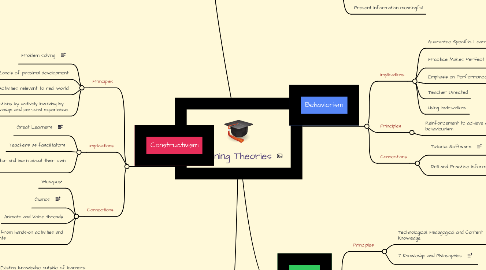
1. Cognitivism
1.1. Principles
1.1.1. Active Learning
1.1.2. Learning & Knowledge is evident by change
1.1.3. Changes behaviour
1.2. Implications
1.2.1. Learning is teacher centered
1.2.2. Mental maps, Advanced organizers, and Chunking
1.2.3. Practicing retention
1.2.4. Concept mapping
1.3. Connections
1.3.1. Mindmeister Prezi Electronic note taking Creating weebly
1.3.2. Use instructional organizers and mapping to assist with materials
1.3.3. Present information meaningful
2. Constructivism
2.1. Principles
2.1.1. Problem solving
2.1.2. Zone's of proximal development
2.1.3. Activities relevant to real world
2.1.4. building connections by actively involving by personal knowledge and personal experience.
2.2. Implications
2.2.1. Great Learners
2.2.2. Teachers as fascilitators
2.2.3. Students monitor and learn about their own performance
2.3. Connections
2.3.1. Webquest
2.3.2. Gizmos
2.3.3. Animoto and Voice threads
2.3.4. Learning from hands-on activities and assignments
3. Connectivism
3.1. Principles
3.1.1. Existing knowledge outside of learners
3.1.2. making connection between information to build knowledge
3.1.3. capacity of knowledge
3.2. Implications
3.2.1. Learning is process of developing network
3.3. Connections
3.3.1. Networking is the learning
3.3.2. Digital Age Learner's
3.3.3. Digital Citizenship
3.3.4. PLN Google Yahoo Bing Flickr
3.3.5. Search Engines
4. Behaviorism
4.1. Implications
4.1.1. Guarantee Specific Learning
4.1.2. Practice Makes Perfect
4.1.3. Emphasis on Performance and Performance
4.1.4. Teacher Directed
4.1.5. Using Instructions
4.2. Principles
4.2.1. Reinforcement to achieve desired behaviourism
4.3. Connections
4.3.1. Tutorial Software
4.3.2. Drill and Practice Information
5. TPACK
5.1. Principles
5.1.1. Technological, Pedagogical and Content Knowledge.
5.1.2. 7 Knowledge and Philosophies
5.2. Implications
5.2.1. Technology within classroom through legal obligation
5.2.2. Teaching techniques
5.3. Connections
5.3.1. Gizmos how to combine technology and content effectively
